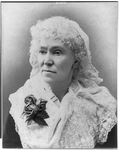
Library of Congress Matilda Joslyn Gage was born in Cicero, New York, an eastern suburb of Syracuse, in 1826. She made her first public speech at the third national Women's Rights convention in Syracuse in 1852, and rapidly became a leader in the women's rights movement. Raised in an Abolitionist home that was a station on the underground railroad, where she was taught multiple languages, Gage was throughout her career among the more radical leaders of the movement, and like Stanton focused particularly on the role of social and religious institutions as well as civil concerns. Her writing focused on significant accomplishments of women in invention, military affairs, and in history. Gage co-authored with Elizabeth Cady Stanton and Susan B. Anthony the first three volumes of A History of Woman Suffrage. She also worked with Stanton on The Woman's Bible, and in 1893 she published Woman, Church and State, her most widely known solo publication. In 1879 Gage's newspaper, The National Citizen and Ballot Box published the early sections of A History of Woman Suffrage, including Stanton's account of the 1848 Seneca Falls Convention. The newspaper was used prior to printing in book form in order to provide an opportunity for comment. In 1880 Gage became the first woman to vote in Fayetteville under a state law that passed permitting women to vote in school board elections. Gage's Fayetteville home is owned by the Matilda Joslyn Gage Foundation, a not-for-profit organization. The house is currently undergoing restoration. The inscription on her grave stone in the Fayetteville Cemetery was a lifelong motto with which she frequently signed autographs, including the 1876 Centennial memorial: There is a word sweeter than Mother, Home or Heaven, that word is Liberty
|
Last updated: February 26, 2015
